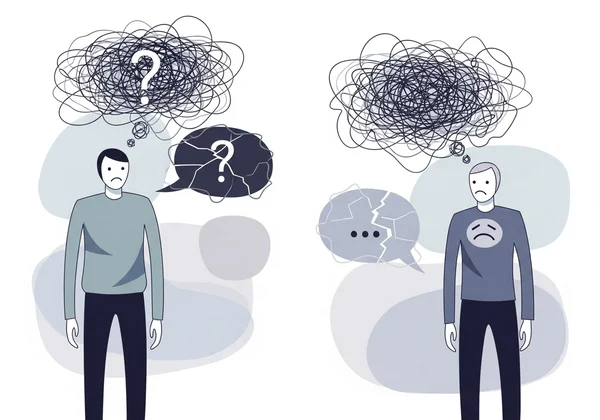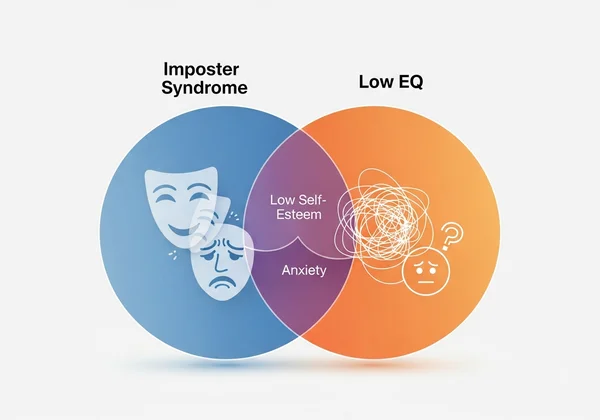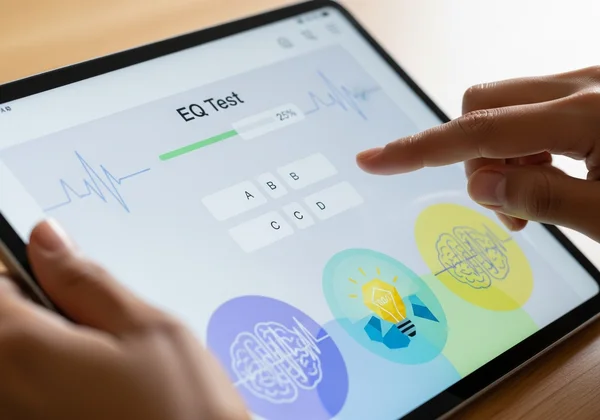Low EQ or Imposter Syndrome? EQ Test for Clarity & Self-Insight
November 20, 2025 | By Isla Caldwell
Have you ever found yourself in a meeting, praised for your work, yet a voice inside whispers, "You just got lucky"? Or maybe you've achieved a significant goal, only to feel like a fraud who is about to be exposed. This nagging feeling of self-doubt is incredibly common, and it often leaves us wondering about its source. Are we dealing with Imposter Syndrome, or could it be something else? For instance, what are the signs of low emotional intelligence? Understanding the difference is the first step toward genuine self-awareness and growth, and a high-quality eq test is the perfect tool to light the way.
This article will guide you through the intricate worlds of Imposter Syndrome and Emotional Intelligence (EQ). We will explore their definitions, highlight their confusing overlaps, and pinpoint their key differences. By the end, you'll have a clearer understanding of your own internal landscape and know how a simple test for self-insight can provide the clarity you need to move forward with confidence.
Understanding Imposter Syndrome: The Doubts Within
Imposter Syndrome is that persistent internal experience of believing that you are not as competent as others perceive you to be. It's the feeling of being a phony, despite a track record of success. As a psychology enthusiast, I see this as a conflict between your external achievements and your internal beliefs. It’s not about a lack of skill, but a flawed perception of your own abilities.

What is Imposter Syndrome and Its Core Traits?
At its heart, Imposter Syndrome is a psychological pattern characterized by intense feelings of self-doubt and personal incompetence. It’s not officially a mental disorder but rather an internal experience that can cause significant distress. Key core traits often include a chronic fear of being discovered as a fraud, an inability to internalize accomplishments, and a tendency to attribute success to external factors like luck or timing rather than your own capabilities.
Common Manifestations of Imposter Syndrome
This feeling can manifest in several ways that might feel familiar. Perfectionism is a common sign; you might set excessively high goals for yourself and feel like a failure even when you achieve 99% of them. Overworking is another manifestation, where you feel the need to work harder than others to prove your worth and justify your position. You may also find yourself downplaying praise or deflecting compliments, believing you don't truly deserve them. This cycle of doubt can hold you back from taking on new challenges, ultimately limiting your personal growth.
Recognizing the Signs of Low Emotional Intelligence
Now, let's shift our focus to Emotional Intelligence, often referred to as EQ. Unlike Imposter Syndrome, which is about perception, EQ is about a set of skills. It’s the ability to perceive, use, understand, manage, and handle emotions. People with high EQ can recognize their own emotional state and the emotional states of others, and use this understanding to navigate social situations effectively. When these skills are underdeveloped, we refer to it as low EQ, which can present a different set of challenges.

Key Dimensions of Low EQ to Look For
Low EQ often reveals itself across five core dimensions. A person may struggle with self-understanding, finding it difficult to identify why they feel a certain way. They might lack self-regulation, leading to emotional outbursts or impulsive decisions. Other signs include low motivation, difficulty staying focused on long-term goals, a lack of empathy for others' feelings, and poor social skills, which can make building and maintaining relationships challenging. If you want to see where you stand, you can always discover your EQ level.
How Low EQ Impacts Daily Life and Relationships
The impact of low EQ on daily life is significant. In the workplace, it can lead to poor communication, difficulty resolving conflicts, and trouble working in a team. You might be misunderstood or find it hard to influence others positively. In personal relationships, low EQ can cause frequent arguments, emotional distance, and a feeling that your partner or friends just don't "get" you. It can turn simple disagreements into major conflicts because the emotional undercurrents are not being managed effectively.
Overlap & Key Differences: Distinguishing the Two
This is where things can get confusing. Both Imposter Syndrome and low EQ can result in self-doubt, anxiety, and difficulty in social or professional settings. Someone with either condition might struggle to accept feedback or feel insecure about their abilities. However, the root causes are fundamentally different, and understanding this distinction is crucial for finding the right path forward.

Where Imposter Syndrome and Low EQ Intersect
The primary overlap is the feeling of inadequacy. Someone with low EQ might feel inadequate because they genuinely struggle to handle an emotional situation, leading to a negative outcome. Someone with Imposter Syndrome feels inadequate despite handling the situation perfectly well, because they believe they don't deserve the success. Both can lead to low self esteem and a fear of failure, creating a cycle of anxiety that can be difficult to break.
Unique Indicators: When is it Imposter Syndrome vs. Low EQ?
Here’s the key difference: Imposter Syndrome is a belief that is disconnected from your actual skills, while low EQ is a skill deficit. A highly skilled leader with high EQ can still suffer from Imposter Syndrome, feeling like a fraud despite their excellent ability to manage their team's emotions. Conversely, someone with low EQ might feel overly confident but repeatedly fail in social interactions because they can't read the room. The clearest indicator is evidence. Is there external proof of your success that you just can't accept? That points to Imposter Syndrome. Or do you consistently receive feedback that your communication or emotional regulation needs work? That may point toward an area of your EQ to develop. An emotional intelligence test can provide objective data to help you see more clearly.
The EQ Test: Your Path to Self-Awareness and Clarity
If you're caught in a loop of self-doubt, trying to untangle these feelings on your own can be exhausting. This is where a well-designed self awareness test becomes an invaluable tool. It moves you from subjective feelings to objective insights, providing a clear, data-driven starting point for your journey of self-discovery. A reliable test can help you identify your emotional strengths and pinpoint specific areas for development.

How a Scientific EQ Test Provides Unbiased Insights
A scientifically validated EQ test, like the one offered at Eqtest.co, is designed to be impartial. It asks scenario-based questions that measure your abilities across the core dimensions of emotional intelligence. Unlike your inner critic, the test doesn't have a bias. It simply reflects your responses and provides unbiased insights into your emotional skill set. This objectivity can be liberating, especially if you're struggling with the distorted perceptions of Imposter Syndrome.
Beyond the Score: AI-Driven Reports for Personalized Clarity
While a score is a useful benchmark, true growth comes from understanding the "why" behind it. This is where modern assessments truly shine. After completing the free test on our platform, you have the option to receive an AI-powered deep analysis report. This report goes far beyond a number, offering personalized clarity by analyzing your unique emotional patterns, identifying potential challenges, and providing a tailored action plan for improvement. It’s like having a personal coach guide you toward becoming a more emotionally intelligent version of yourself. Are you ready to get your free analysis?
Unraveling Your Inner Landscape: Take the Next Step
Distinguishing between Imposter Syndrome and low EQ is more than an intellectual exercise; it's a vital step toward self-acceptance and effective personal development. One is a battle against a distorted self-perception, while the other is an opportunity to build crucial life skills. Recognizing which one resonates more with you can change the way you approach your personal and professional challenges.
The journey to understanding your inner landscape starts with a single, simple action. Don't let confusion and self-doubt hold you back any longer. Gain the clarity you deserve.
Visit Eqtest.co today to take our free, scientifically-backed EQ test and begin your journey toward greater self-awareness and confidence.
Frequently Asked Questions About EQ, Imposter Syndrome, & Testing
What is the most accurate EQ test available?
The most accurate eq test is one based on established psychological models of emotional intelligence. While no single test is 100% definitive, those designed with scientific rigor, like the one on our platform, provide a highly reliable snapshot of your emotional skills. They offer a solid foundation for self-reflection and growth, moving beyond simple online quizzes to provide meaningful data.
How can I test my EQ for free to start?
You can easily get started without any cost. Many platforms, including ours, offer a free introductory test to help you get a baseline understanding of your emotional intelligence. Simply visit our homepage to start your EQ test instantly, with no registration required. This is a risk-free first step to gaining valuable self-knowledge.
What does a 'low' EQ score truly mean for me?
A low eq score is not a life sentence or a measure of your worth as a person. Think of it as a helpful signpost pointing toward areas for growth. It simply indicates that there are specific emotional skills you can develop to improve your relationships, well-being, and professional effectiveness. Our AI-driven reports are designed to help you do just that by providing actionable steps.
Can a person have high IQ but low EQ?
Absolutely. IQ (Intelligence Quotient) and EQ (Emotional Quotient) are distinct types of intelligence. IQ measures cognitive abilities like logic and reasoning, while EQ measures emotional skills. It's quite common for someone to be a brilliant thinker but struggle to manage their emotions or connect with others. This highlights why it is so important to improve emotional intelligence for overall life success.
What are the signs of low emotional intelligence in daily life?
In everyday situations, the signs include frequent misunderstandings with others, difficulty managing stress, making impulsive decisions you later regret, struggling to accept constructive criticism, and feeling like you don't understand why people react the way they do. If these sound familiar, exploring your EQ could be incredibly beneficial. Why not take the first step today?